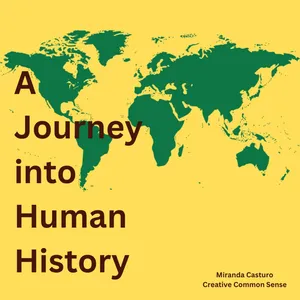Gunpowder and Nomads in a Transitional Age

The adoption of firearms made the fighting style of nomadic societies less effective. These societies declined in size and number when governments forced them to settle. Sometimes settled peopleâs fear of nomads forced governments to take action against them. The competition for natural resources also encouraged many nomadic pastoralists to abandon their way of life.
All images referenced in this podcast can be found at https://openstax.org/books/world-history-volume-1/pages/17-3-gunpowder-and-nomads-in-a-transitional-age
Welcome to A Journey into Human History.
This podcast will attempt to tell the whole human story.
The content contained in this podcast was produced by OpenStax and is licensed under a Creative Commons Attribution License.
Access for free at https://openstax.org/books/world-history-volume-1/pages/1-introduction
Podcast produced by Miranda Casturo as a Creative Common Sense production.








